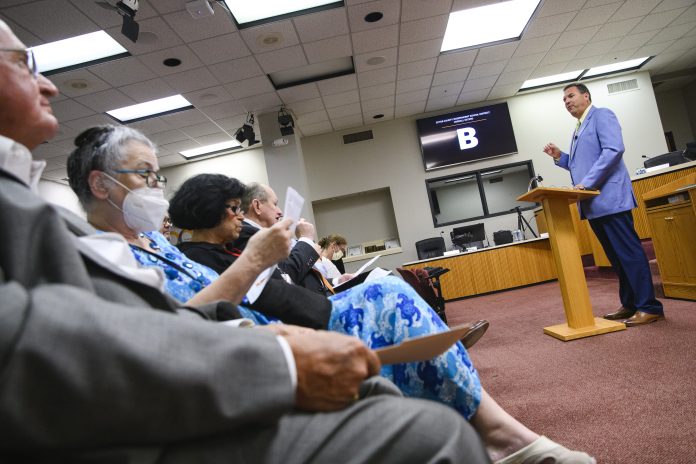
School districts statewide, including Ector County ISD, are bracing themselves for how they’ll do in redesigned accountability standards this year.
Superintendent Scott Muri said Commissioner of Education Mike Morath spoke to the State Board of Education last week and warned that there are going to be significant changes in calculations based on the redesigned accountability system.
These resets happen every five years under state statute, Muri said.
“We’re going to see that across the state of Texas. Schools that may have been highly rated are not going to be highly rated because of the change. What happens every five years in Texas, there’s a redesign of the state accountability system and a new bar is set. … If you’re a hurdler and you are accustomed to a bar being a certain height, the bar is now going to be raised,” Muri said.
At the same time, students also took a redesigned, more rigorous version of the STAAR and end-of-course exams, so it was kind of a double whammy.
The question types were different and different ways to answer questions that included highlighting of different passages.
It included digitally moving responses around, multiple answers for a single question. Some answers were more right than others.
“It required a lot more thinking this year than tests … in the past. … Writing is now embedded. The writing component is not a separate part. It is now embedded in the work and so kids had to type answers” in full sentences, Muri said.
“From a numbers perspective, college career military readiness, that is one aspect of high school grades. Up until this year, the bar to make an A in that area was 60%,” Muri said.
Last year, ECISD scored 65 percent. This year, it has to reach 88 percent to make an A. The 60 that would be an A is now a D.
Domains they look at are proficiency; the grade level preparedness of students in different subjects; the second area is individual student growth; third is closing the gaps, the subpopulation gaps such as gaps between white students and students of color; the gap between economically disadvantaged and those who are not; the gap between special education and general population.
“All of the tests and the other components are increasing their standard as well. And so yes, there will be a lot of shock and awe across the state of Texas. And here’s the irony is we as an organization, we will do better and could be worse. So our CCMR, I’m very confident that our CCMR, which was 65 this year, is going to be higher. But yet the grade associated with that is lower,” Muri said.
“That is going to be very difficult to explain to the general public. … The commissioner, again, has been out in front trying to help people understand. … He spoke with the state board,” he added.
The data won’t be released publicly until Sept. 28.
“That’s how late it is going to be. We’ve seen some numbers, but we don’t know how good those numbers are because there’s no scale yet. … The state’s working on that,” Muri said.
Muri said even though he expects the district to do better than last year, their scores could be worse. He added that he has seen early indicators that show the district’s college career military readiness numbers will be better than last year, but they won’t be an 88.
Muri said the state doesn’t expect districts to make that 28-point jump. Over the next five years, you should make your way to that mark.
He said the standards have remained the same and were not changed during COVID.
“We’ve had the same standard for five years. This is the year that it’s changing. We did well because our kids grew and so it was all about growth. We released our MAP results about a month ago at the board meeting … Once again, we saw our kids growing at rates that made us very pleased with what’s happening. We have also seen that when our kids are growing, that is followed by proficiency. We know that we’re going to be more proficient than we were last year because of the growth,” Muri said.
He added that he knows the accountability rating results will affect students and teachers emotionally.
Part of the push during the legislative session was to create a phase-in process for the accountability system because of the new test, the new accountability system and continued recovery from the pandemic. But nothing was done.



